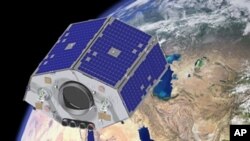Nigeria recently launched two new observation satellites designed to assist farmers and help with disaster management, among other tasks. Experts say the new satellites mark a major leap forward for the Nigerian space program.
At the top of the sky, where space begins, two satellites are gliding into position, oriented by the glow of the galaxy and the uplink command from Abuja. This is Nigeria's space program.
This week, a team of rocket scientists in Africa's most populous country are guiding into place Nigeria's third and fourth satellites, fired into orbit last week.
The two satellites include the first built by Africans, but they are not for mapping the cosmos. They are for mapping Lagos, a megacity that seems as vast as the Milky Way.
As many as 17 million people live in Lagos State alone, a crowded constellation of humanity that has hardly been mapped.
Cameras perched on Nigeria's two newest satellites will allow municipal leaders to chart the city they preside over, says Steve Young, who is head of business development for the company that built one of the two satellites, Surrey Satellite Technology.
Lagos residents will directly benefit from their country's space program, he says, and governments presiding over Africa's other megacities may soon follow.
"We often take it for granted in industrialized nations that we have all this information, we have accurate maps, we have land registries, we have planning systems, we have precision agriculture systems. We have all this stuff in place, but for a lot of countries, they don't," Young noted.
But the new satellites, Nigeria Sat-2 and Nigeria Sat-X, will do more than photograph sub-Saharan Africa's largest city. They will take infrared readings of Nigeria's farms, and beam down data estimating next season's crop forecast. They will also offer farmers satellite data on where to apply fertilizer, and keep tabs on how Nigeria's desert areas are spreading.
When disaster strikes, aid agencies will rely on the photographs the satellites provide.
Up to now when confronted by disasters Nigeria has often relied on purchased photos from other satellites, says Umar Isah of Nigerian Communications Satellites. He says the two new satellites will boost Nigeria's space capabilities.
"So if we can have our own satellite? And apart from that the four satellites that Nigeria has built, Nigerian engineers work on that, and if we're able to be launching this, we're able to build another one side by side with the Surrey engineers. So at least in terms of human development it's something," said Isah.
That, Young agrees, is Nigeria's real space dividend. More than 40 Nigerian space engineers are studying for PhD or Master's degrees in computer science worldwide, he says. He says when they come home, they will be like rocket fuel for the country's fledgling high-tech industry.
"You are now beginning to train a corps of very experienced engineers, high-technology technicians, and people who are going to benefit the wider economy," said Young. "That also is a very good effect that the Nigerians get in investing in high-tech programs. They've got to develop their economy and that's one of the ways they do that is by doing this."
Critics say the space program is a prestige mission by Nigeria's rich elite. Four-fifths of the country lives on less than $2 a day, despite an unending flow of oil money.
Isah says Nigerians cannot let their problems on Earth stop them from exploring the promise of the stars.
Nigeria Expects Flow of Information from New Satellites
- By Drew Hinshaw




